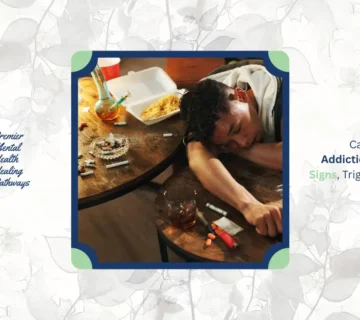Your life just imploded. Maybe it was sudden—a phone call, a diagnosis, walking in on something you can’t unsee.
Those moments when life falls apart can feel like standing in the wreckage of everything you thought you knew.
Either way, you’re sitting in the rubble now, wondering what you’re supposed to do next.
The Reality of Life’s Upheavals
We’re not going to tell you that everything happens for a reason. Sometimes life is just difficult, and pretending otherwise helps no one.
One in eight people globally deals with mental health disorders.
That’s not counting everyone else who’s had their life turned upside down by circumstances beyond their control.
The difference between people who rebuild and people who stay stuck isn’t that some are stronger or smarter.
It’s usually just that they had better information about how to navigate the aftermath.
What Your First Steps Should Be
When everything feels chaotic, your brain goes into survival mode. That’s normal.
But survival mode isn’t great for making decisions or seeing possibilities. So before you do anything else, you need to stabilize.
- Sleep. Even if it’s broken sleep, even if you need help getting there. Your brain can’t process trauma or make good decisions when you’re running on fumes.
- Eat something. Doesn’t have to be perfect. Just fuel your body consistently so it can do the work of healing.
- Move. Walk around the block. Do some push-ups. Dance in your kitchen. Physical movement helps process stress hormones and signals to your nervous system that you’re safe.
Talk to someone who won’t try to fix or give you platitudes. Sometimes you just need someone to witness that this is hard without trying to make it better.
How to Start Over
Here’s what no one tells you about starting over: you don’t actually start from zero.
You start from everything you’ve learned, including what you’re learning right now about yourself and what you can handle.
- Take stock of what happened without being harsh with yourself about it. What patterns added to this situation? What warning signs did you overlook? What worked that you want to keep? This isn’t about blame.
- Figure out what matters to you now. Not what mattered before, not what you think should matter, but what feels essential when everything else is stripped away. These are your guideposts.
- Decide on the things you no longer want to accept in your relationships. You should refuse specific people, circumstances, or ideas that no longer support you.
- Start small. Take your time and repair things in stages. Choose just one part of your life—home, work, or leisure—and do something to improve it.
What Makes the Difference
Being resilient is not something you are born with. It’s something you can improve. Like with any other skill, you have the ability to grow in it.
Resilient people react to stress in a different way, have a positive outlook, use helpful methods to cope, and form strong bonds with others.
Brains have a natural ability to heal and adjust to things.
Every time you choose a different response to an old trigger, you’re literally rewiring your neural pathways.
Every small step toward something meaningful builds evidence that change is possible.
The story you tell yourself about what happened matters, too.
You can be someone who went through something terrible, or you can be someone who survived something terrible and is now choosing what comes next.
Both are true, but one helps you move forward.
Building What Comes Next
When you have to begin again, you can be very thoughtful about what you recreate. This is a helpful experience, despite the difficulty you feel.
- Imagine what is most important to you when nothing else impacts you. These things help you decide how best to spend your time and who you want to be with.
- Consider the kind of life you wish to develop. Not the same as your past, nor what is expected, but something that fits with who you are right now.
- Create a network of people who can help you. It could involve strengthening your current relationships, joining groups with similar interests, or finding professionals who know what you experience.
The Unexpected Part
Most people who go through major life disruptions report that their post-crisis life is more aligned with their values and more meaningful than what came before.
They wouldn’t choose to go through it again, but wouldn’t trade where it led them.
This isn’t about finding silver linings or being grateful for trauma.
It’s about recognizing that sometimes we must break down completely to discover who we are underneath all the expectations and obligations.
Getting Professional Support
Rebuilding your life is challenging work, and professional guidance can be helpful.
Whether therapy, medical support, or comprehensive wellness care, having the right team makes all the difference.
At Premier Mental Health Healing Pathways, we realize that starting over can be helpful when we address both symptoms and the deeper patterns related to your well-being.
Our approach is designed to help you thrive in your fresh start.
Premier Mental Health Healing Pathways Care today to learn how our personalized approach can support you.
You’ve already survived the most difficult part—now let’s help you create something worth surviving for.
FAQs
How long does this take?
There’s no timeline. Some people feel better in a few months, others need years. Focus on progress, not speed.
Is it normal to feel scared?
Yes. Fear is your nervous system’s normal response to uncertainty. You can feel scared and still move forward.
Should I make big decisions right now?
Probably not, unless staying where you are feels dangerous. Give yourself time to stabilize before making major, irreversible changes.
How do I know if we need professional help?
If you’re having thoughts of self-harm, can’t function in daily life, or feel stuck after several months, consider professional support.
Also, consider it if you just want guidance from someone trained in helping people through major transitions.
What if I don’t know what I want?
That’s normal and healthy—s you’re open to possibilities instead of forcing old patterns. Start with small experiments and pay attention to what feels right.






No comment